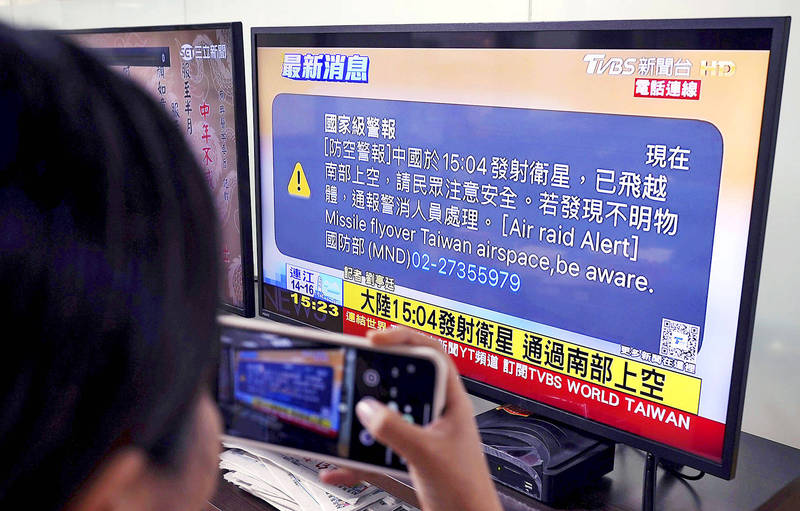《TAIPEI TIMES》 China satellite triggers air raid alert

A person in Taipei takes a photograph of a news broadcast about a Chinese satellite launch that passed over southern Taiwan yesterday. Photo: Kyodo News via AP
ELECTION JITTERS: The satellite launch was part of a pattern of harassment by China, which includes sending balloons over Taiwan, Minister of Foreign Affairs Joseph Wu said
/ Agencies
The government yesterday issued an air raid alert after the launch of a Chinese satellite launch, of which the trajectory passed through airspace over southern Taiwan.
The Ministry of National Defense issued the warning, accompanied by a shrill alarm ringing across Taiwan, to mobile phones at 3:17pm. It cautioned the public about possible debris tumbling from the sky.
“If any unidentified objects are found, please report that to the police and fire department,” it said.
Although the message said “satellite” in Chinese, the English text in the alert called the object that traveled over the nation “a missile,” phrasing that added to the initial anxiety. The ministry later apologized for the “imprecise” choice of words.
While China’s satellite launches have traveled high above Taiwan in the past, the latest episode raises concern it could be part of Beijing’s efforts to intimidate voters just days before Saturday’s presidential and legislative elections.
The ministry said the Chinese rocket flew over the south at a high altitude.
The alert came around the same time Chinese state media confirmed the launch of a science satellite.
Chinese state-run Xinhua news agency said a Long March 2C rocket carrying a “a new astronomical satellite” called the Einstein Probe was launched from the Xichang Satellite Launch Center in Sichuan Province.
“The satellite successfully entered its predetermined orbit, and the launch mission was a complete success,” China’s state broadcaster said.
China had not previously announced the satellite launch and did not offer any details on its flight plan.
China made two satellite launches on consecutive days early last month from a launch site in Inner Mongolia. Neither of those flew over Taiwan or triggered an alert.
China’s state media described the probe launched as a small satellite dedicated to high-energy astrophysics and astronomy.
In Taipei, Minister of Foreign Affairs Joseph Wu (吳釗燮), who was holding a news conference when the shrill alert sounded, described the launch as part of a pattern of harassment toward Taiwan, just like recent cases of Chinese balloons flying over the nation.
“All these kinds of tactics are classified as gray zone activities, [and] continue to remind the people here in Taiwan that there is a danger of war between Taiwan and China,” he said.
President Tsai Ing-wen (蔡英文), who was at a campaign event in Kaohsiung, urged the public not to worry.
“It is alright. The president is here, with all of you,” she later wrote on Facebook, adding that the alert was part of information transparency in a democratic society.
Chinese Nationalist Party (KMT) Chairman Eric Chu (朱立倫) criticized the government for sending a “misleading” alert.
“This is the first time I’ve heard that a satellite launch could prompt national warnings,” Chu said.
“Maybe everyone was startled, thinking it was a missile, only to realize it was a satellite,” he added.
He said the ministry was attempting to mislead the public by issuing the alert.
Premier Chen Chien-jen (陳建仁) defended the issuance of the alert, saying that the government has a responsibility to inform the public.
Meanwhile, Taiwan People’s Party presidential candidate Ko Wen-je (柯文哲) said yesterday that it was vital for the government to review its standard operating procedures in handling such a matter.
He also called for the establishment of a "hotline" between Taipei and Beijing similar to the Moscow- Washington link during the Cold War to allow for direct communication between leaders.
Additional reportional by CNA
新聞來源:TAIPEI TIMES
















